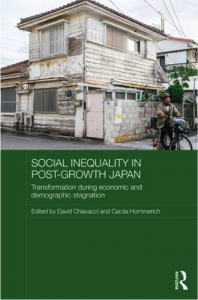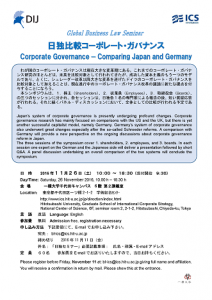Veranstaltungen und Aktivitäten
Who pays for whom? Intergenerational Transfers in Japan and Germany
Population ageing tends to increase the share of financially dependent members in a given society, which is why it is often assumed to be a trigger for generational conflict. The data on this question paint an ambivalent picture. On the one hand, in many post-industrial economies, today’s younger birth cohorts are put at a disadvantage in the labour market and also in terms of public sector spending compared to older cohorts. On the other hand, there is a tendency of private transfers inside the family to flow downwards – from old to young. It appears that a potential generational conflict in the public domain (welfare state, labour market) is at least partly balanced in the family domain. To what extent this is the case will be analysed by using data from National Transfer Accounts, an internationally harmonized macro-level database of financial intergenerational transfers.
Speakers:
Naohiro Ogawa is a population economist who specializes in studying the effects of demographic change on economic growth and social security systems.
Gerhard Naegele has been a professor of gerontology at the Technical University of Dortmund, Institute of Gerontology since 1992.
Staatsverschuldung – Warum setzt Deutschland auf Konsolidierung?

Bernhardt Schulte-Drüggelte
Mitglied des Deutschen Bundestages
Franz Waldenberger
Direktor des DIJ
Deutschland und Japan verfolgen eine sehr unterschiedliche Haushaltspolitik. Deutschland setzt auf Konsolidierung. Der Staat unterliegt neben den im Stabilitätspakt von Maastricht definierten Verschuldungsobergrenzen auch einer verfassungsrechtlichen „Schuldenbremse, die einen in der Regel ausgeglichenen Haushalt vorsieht.
Japan, das inzwischen gemessen an der Schuldenquote zu den am höchsten verschuldeten OECD Ländern gehört, räumt einem ausgeglichenen Staatshaushalt dagegen keine besondere politische Priorität ein.
Book Launch: Social Inequality in Post-Growth Japan Transformation during Economic and Demographic Stagnation

Speakers:
David Chiavacci
Mercator Professor in Social Science of Japan, University of Zurich
Carola Hommerich
Associate Professor of Sociology, Hokkaido University
Sawako Shirahase
Professor of Sociology, The University of Tokyo
In recent decades Japan has changed from a strongly growing, economically successful country regarded as prime example of social equality and inclusion to a country with a stagnating economy, a shrinking population and a very high proportion of elderly people. New forms of inequality have been emerging and deepening, and a new perception of Japan as “gap society” (kakusa shakai) has become commonly acknowledged.
The book provides a comprehensive overview of inequality in contemporary Japan. It examines inequality in labor and employment, welfare and family, education and social mobility, in the urban-rural divide, and with regard to immigration, ethnic minorities and gender.
The Ideologue and Activist Ōkawa Shūmei (1886-1957)

Ōkawa Shūmei is generally known for his involvement in the Japanese right-wing movement that led to his arrest after the “Incident of May 15” in 1932. Ōkawas activities after his release from prison in 1937 until his indictment as a war criminal in 1946 have not been explored widely.
Ōkawa was a prolific writer who covered diverse topics, including religion, Asianism, the Indian independence movement, colonial history, Japanese history and the “Japanese spirit”. This talk will summarize Ōkawas life, his thinking and his actions against the background of his times. In this context it will also explore the Japanese ideological concept of the “national essence” (kokutai), the tensions between collectivism and statism (kokka shugi) vs. individualism, and political utopianism in the Japanese far right before 1945.
Emperor Hirohito from the Pacific War to the Cold War
Emperor Showa, better known in the English-speaking world as Emperor Hirohito, has been one of the most controversial figures in the history of the Pacific War. He was both sovereign of the state and commander in chief of the Japanese imperial forces; but above all, he was the manifestation of divinity and a symbol of the national and cultural identity of Japan. Yet under the Allied occupation the emperor was spared from the Tokyo war crimes trial and continued to reign in postwar Japan until his death in 1989 as “the symbol of the state and of the unity of the people” under the new democratic constitution written by the U.S. occupiers.
This talk will examine the extraordinary transformation of Emperor Hirohito from a divine monarch during the Pacific War to a humanized symbolic monarch supposedly with no political power during the occupation years (1945-1952). The talk will focus on the paradoxical role Emperor Hirohito played at home and abroad as tension between the United States and the Soviet Union escalated into the Cold War in East Asia.
Effects of Zero Interest Rate Monetary Policy on Banks and Society
In Japan, zero interest rate monetary policy and unconventional easing measures have prevailed for almost two decades. It is possible that these policies have had incisive side-effects aside from effects on inflation (expectations).
Our roundtable will focus on the implications of these measures for banks and society by way of macro-economic theory as well as empirical evidence.
Between Nostalgia and Utopia: Alternative Lifestyles in Rural Japan
The Japanese countryside has for decades seen its population shrinking and aging. But in recent years some regions have experienced an influx of new residents, urban-to-rural migrants, looking for a new life in the Japanese countryside.
This so-called I-turn trend has been increasingly covered by the popular media. Magazines and websites providing information and support for people interested in moving to rural areas suggest that life in the countryside promises a meaningful job, a good work-life-balance, a life close to nature and a small, supportive community. They evoke an image of a nostalgic picturesque ‘homeland’ (furusato), where an ‘old Japanese way of life’ has been preserved. But what story does the individual I-turner tell?
Corporate Governance – Comparing Japan and Germany

Japan’s system of corporate governance is presently undergoing profound changes. Corporate governance research has mainly focused on comparisons with the US and the UK, but there is yet another successful capitalist model, namely Germany.
Germany’s system of corporate governance also underwent great changes especially after the so-called Schroeder reforms. A comparison with Germany will provide a new perspective on the ongoing discussions about corporate governance reform in Japan.
A panel discussion undertaking an overall comparison of the two systems will conclude the symposium.
Scheduled:
November 26, 2016 | 10:00 A.M. – 6:30 P.M.
Registration deadline:
November 11, 2016








 Open Access
Open Access 
